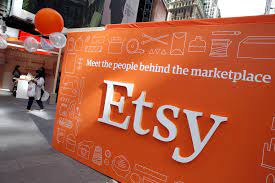In the ever-evolving landscape of e-commerce, Etsy Inc. stands out as a unique and vibrant platform that has redefined the way artisans, crafters, and small businesses connect with a global audience. Founded in 2005 by Rob Kalin, Chris Maguire, and Haim Schoppik. Etsy has grown into a powerhouse, fostering a community where creativity thrives. This article explores the journey, impact, and the business model that has made Etsy a household name for those seeking one-of-a-kind handmade and vintage items.
The Birth of Etsy
Etsy was born out of a desire to provide a virtual marketplace for handmade and vintage goods. Rob Kalin, the visionary behind Etsy, was frustrated by the lack of online platforms catering to independent artists and craftspeople. His mission was to create a space where these individuals could showcase their talents and connect with buyers who appreciated the value of unique, handcrafted items.
In June 2005, Etsy was officially launched, and it quickly gained attention for its focus on craftsmanship, individuality, and community. The name “Etsy” was inspired by an Italian word meaning “oh, yes.” This whimsical choice set the tone for what would become a platform celebrating the joy of discovery and the satisfaction of owning something special.
Building a Creative Community
At the heart of Etsy’s success is its commitment to fostering a community of makers and buyers who share a passion for craftsmanship. Etsy provides a virtual space where artisans can not only sell their products but also connect with like-minded individuals, share stories, and exchange ideas. This sense of community has been instrumental in differentiating Etsy from other e-commerce giants.
Etsy’s forums, blogs, and social media channels create a supportive environment for sellers to learn from each other, discuss best practices, and stay informed about market trends. This collaborative spirit has contributed to the platform’s growth and has solidified Etsy’s reputation as a place where creativity is nurtured.
The Etsy Marketplace
Etsy’s marketplace is a treasure trove of unique, handmade, and vintage items. The platform caters to a diverse range of categories, including jewelry, home decor, clothing, art, and much more. Unlike mass-produced items found on other e-commerce platforms, Etsy’s offerings are characterized by their individuality, often telling a story about the artisan and their craft.
One of Etsy’s distinctive features is its commitment to sustainability. The platform emphasizes the value of repurposing and recycling by encouraging the sale of vintage items and eco-friendly handmade products. This eco-conscious approach not only aligns with current consumer trends but also positions Etsy as a responsible and forward-thinking marketplace.
Empowering Sellers with Etsy’s Business Model
Etsy operates on a model that empowers individual sellers and small businesses. The platform allows artisans to set up their own shops, customize their storefronts, and directly engage with customers. Etsy charges a nominal listing fee for each product, a transaction fee for completed sales, and optional fees for additional services like promoted listings or payment processing. This transparent fee structure enables sellers to understand their costs and maximize their profits.
Etsy’s commitment to transparency extends beyond its fee structure. The platform provides sellers with valuable data and analytics to help them understand customer behavior, track sales trends, and optimize their listings. This data-driven approach empowers sellers to make informed decisions and improve their businesses over time.
In addition to individual shops, Etsy also supports larger-scale production through its “Etsy Manufacturing” initiative. This program connects sellers with manufacturers, making it easier for them to scale their operations while maintaining the quality and authenticity that defines Etsy’s brand.
Navigating Challenges and Evolving Strategies
While Etsy has experienced tremendous success, it has not been without its challenges. The platform has faced criticism for allowing the sale of mass-produced items and reselling, which some argue dilutes the unique and handmade ethos. In response, Etsy has continuously refined its policies to maintain the integrity of the marketplace.
The company has also faced competition from other e-commerce giants and changing consumer preferences. In response, Etsy has expanded its offerings and introduced features like “Etsy Plus” and “Etsy Ads” to help sellers boost their visibility and reach a broader audience. These initiatives demonstrate Etsy’s adaptability and commitment to staying ahead in the dynamic e-commerce landscape.
Etsy’s Impact on Local Economies
One of the significant impacts of Etsy is its contribution to local economies worldwide. By providing a platform for small businesses and artisans, Etsy has become a lifeline for many individuals seeking to turn their passion into a sustainable livelihood. The platform’s global reach allows sellers to connect with buyers from different corners of the world, creating a virtual marketplace that transcends geographical boundaries.
Etsy’s commitment to supporting local businesses is also evident in its efforts to highlight sellers based on their location. The “Etsy Local” feature allows buyers to discover and support sellers in their vicinity, fostering a sense of community and encouraging local commerce.
Innovation and Expansion
Etsy’s success is not only attributed to its commitment to handmade and vintage goods but also its ability to innovate. The company has embraced technological advancements, continually enhancing its platform to provide a seamless and enjoyable shopping experience. Features like “Etsy Studio” for craft supplies and “Etsy Studio” for digital products showcase the platform’s commitment to diversification.
Moreover, Etsy’s expansion beyond its online marketplace includes ventures like “Etsy Wholesale” and partnerships with major retailers. These initiatives aim to bring Etsy’s unique offerings to a broader audience while providing sellers with new opportunities for growth.
Conclusion
Etsy Inc. has undeniably left an indelible mark on the e-commerce landscape by creating a platform where creativity flourishes, and individuality is celebrated. From its humble beginnings in 2005 to its status as a publicly traded company, Etsy has maintained its commitment to supporting artisans, crafters, and small businesses.
As the digital marketplace continues to evolve, Etsy’s ability to adapt, innovate, and stay true to its core values will be crucial for its sustained success. By empowering sellers, fostering a sense of community, and embracing technological advancements, Etsy Inc. has not only become a global marketplace but a symbol of the power of creativity in the digital age.

